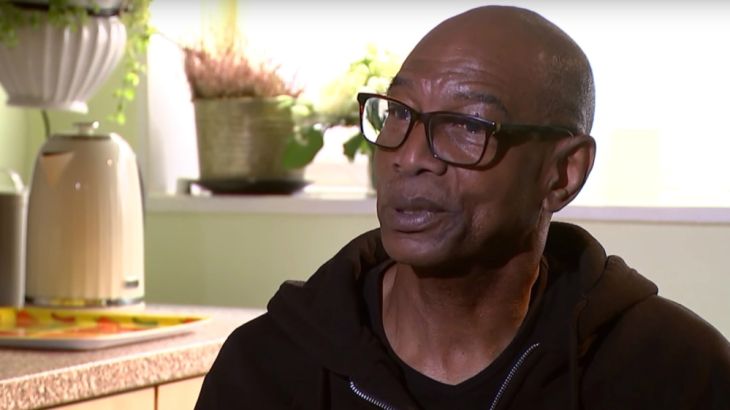The UK’s Windrush generation: What’s the scandal about?
UK Prime Minister Theresa May issues an apology to Caribbean leaders for the treatment of immigrants, but is it enough?

UK Prime Minister Theresa May has apologised to 12 Caribbean nations for the treatment of people from the so-called “Windrush generation”.
On Tuesday, May told leaders and diplomats attending a summit of Commonwealth heads of government in London that she was “genuinely sorry for any anxiety that has been caused”.
Keep reading
list of 4 itemsAgadez, Niger’s gateway to the Sahara, finds new life in the migrant trade
Forced from home, these Colombians struggle to live in a basketball stadium
UN says 38 dead, including children, as migrant boat sinks off Djibouti
Her statement came amid a scandal over the treatment of immigrants who arrived in the UK after the World War II to address labour shortages.
When May was home secretary in 2012, she set out to create strict new rules which required employers, health services and landlords to demand evidence of people’s immigration status.
Here’s what you need to know.
What is the Windrush generation?
The Windrush generation refers to the immigrants who were invited to the UK between 1948 and 1971 from Caribbean countries such as Jamaica, Trinidad and Tobago and Barbados.
The name derives from the ship MV Empire Windrush, which on June 22, 1948, docked in Tilbury, Essex, bringing nearly 500 Jamaicans to the UK.
The immigrants came at the invitation of the British government, which was facing a labour shortage due to the destruction caused by World War II.
The 1971 Immigration Act gave Commonwealth citizens who were already living in the UK indefinite leave to remain.
What is happening to them?
A scandal over the treatment of members of the Windrush generation has been mounting in recent months as a multitude of reports have come out about mostly elderly people being denied services, losing their jobs and even facing deportation.
Many of the Windrush generation had arrived as children on their parents’ passports. And although they have lived in Britain for many decades – paying taxes and insurance – they never formally became British citizens.
Amid the tightening of the immigration rules, an estimated 50,000 long-term UK residents could now be facing problems.
Among them is Michael Braithwaite, who arrived from Barbados when he was nine, more than 50 years ago.
Thinking that he was British, Braithwaite never applied for a passport and did not realise there was a problem with his immigration status until 2016. In 2017, he lost his job at a school where he had worked for more than 15 years.
“If I was deported, I don’t know what I would do. To take someone out and just throw them out, like they had no worth,” Braithwaite told Al Jazeera.
“It’s about worth, what you’ve done to help Britain be the better place that it was.”
In recent months, the British media has been reporting about a growing number of similar cases.
In late November, The Guardian reported that Paulette Wilson, 61, spent a week at a detention centre and was nearly deported to Jamaica, despite having been in Britain for 50 years.
Albert Thompson (not his real name), 63, was also reported to have been denied free cancer treatment through the British publicly funded National Health Service (NHS) for failing to provide evidence that he had lived in the UK since 1973.
What has the reaction been?
Last Thursday, Caribbean diplomats called on the UK to resolve the issues faced by the Windrush generation.
“I am dismayed that people who gave their all to Britain could be seemingly discarded so matter-of-factly,” The Guardian quoted Guy Hewitt, Barbados high commissioner to the UK, as saying.
On Monday, David Lammy, an opposition member of the UK parliament, launched a scathing critique of the government, telling parliamentarians it was a “day of shame”.
“It is inhumane and cruel for so many of that Windrush generation to have suffered so long in this condition,” he said.
A petition asking the government to give “amnesty” to minors who arrived in Britain between 1948 and 1971 had gathered more than 165,000 signatures by Wednesday morning.
How has the UK government responded?
On Monday, UK Home Secretary Amber Rudd apologised for the “appalling” treatment received by some of the Windrush generation.
“I am concerned that the Home Office has become too concerned with policy and strategy and sometimes loses sight of the individual,” she told the British parliament.
Rudd also announced the creation of a new team tasked with helping long-term UK residents born in the Commonwealth prove they are entitled to stay. She said she was “not aware of any person being removed” and vowed to find out from High Commissioners of the Commonwealth countries.
May issued her apology to the Caribbean leaders after initially refusing to discuss the controversy with them.
“I want to dispel any impression that my government is in any sense clamping down on Commonwealth citizens, particularly those from the Caribbean who have built a life here,” she told them.
Those attending the meeting included representatives from Antigua and Barbuda, The Bahamas, Barbados, Belize, Dominica, Grenada, Guyana, Jamaica, St Kitts and Nevis, St Lucia, St Vincent and the Grenadines and Trinidad and Tobago.